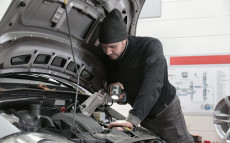- pathfindersAI
- Job Profile
Bus and Truck Mechanics and Diesel Engine Specialists
Summary
Bus and Truck Mechanics and Diesel Engine Specialists: A Career Overview
What They Do
Bus and Truck Mechanics and Diesel Engine Specialists are the unseen heroes of the transportation industry. They ensure that our buses, trucks, and other diesel-powered vehicles operate smoothly and efficiently. These professionals are adept at diagnosing, repairing, and maintaining the complex machinery that powers large vehicles. Whether it’s a school bus ferrying children safely to school or a long-haul truck delivering essential goods across the country, the seamless operation of these vehicles relies heavily on the expertise of these specialized mechanics.
Job Responsibilities
The job responsibilities of Bus and Truck Mechanics and Diesel Engine Specialists are diverse and multifaceted. They perform routine maintenance tasks such as oil changes, tire rotations, and brake inspections. They are also responsible for more complex diagnostic work, where they use advanced computer systems to identify engine issues. Once a problem is identified, these specialists disassemble and inspect engines and other components, replacing worn parts and conducting repairs. They also perform post-repair tests to ensure everything functions as it should. Moreover, they maintain logs of their work to comply with safety and regulatory standards.
Essential Skills
To excel as a Bus and Truck Mechanic and Diesel Engine Specialist, one must possess a variety of essential skills. Technical aptitude is paramount, as these specialists frequently work with sophisticated diagnostic equipment and a plethora of mechanical components. Problem-solving skills are equally critical; they must be able to identify issues quickly and determine the most effective method of repair. Strong attention to detail ensures that even the smallest abnormalities are caught and corrected. Physical stamina is also important, as the job often involves heavy lifting and extended periods of standing or kneeling. Finally, good communication skills are necessary for explaining technical issues to clients and collaborating with other team members.
Educational Pathways
Pursuing a career as a Bus and Truck Mechanic and Diesel Engine Specialist generally requires a blend of formal education and hands-on experience. Most employers prefer candidates who have completed a postsecondary education program in diesel technology or a related field. These programs typically offer courses in engine repair, electronics, and computer diagnostics. Many also provide valuable hands-on training and internships, which are critical for gaining experience. Additionally, obtaining certification through organizations such as the National Institute for Automotive Service Excellence (ASE) can significantly enhance job prospects and earning potential.
Career Prospects
The career prospects for Bus and Truck Mechanics and Diesel Engine Specialists are highly favorable. According to the U.S. Bureau of Labor Statistics, employment in this field is expected to grow at a steady rate over the next decade. The increasing complexity of diesel engines and technological advancements in the industry drive the demand for highly skilled specialists. Opportunities abound in various sectors, including transportation, logistics, construction, and government agencies. Experienced mechanics may also choose to advance their careers by becoming service managers, supervisors, or even starting their own repair businesses.
Conclusion
In conclusion, a career as a Bus and Truck Mechanic and Diesel Engine Specialist offers a stable and rewarding opportunity for those who possess the necessary skills and education. These professionals play an integral role in maintaining the safety and efficiency of our transportation systems. With ample job prospects, opportunities for advancement, and the personal satisfaction of solving complex mechanical problems, this career path is an excellent choice for individuals looking to make a tangible impact while enjoying a challenging and dynamic work environment.
Video
Compensation
| State | Median Salary | Median Hourly | Positions |
|---|---|---|---|
| AL | 49,080 | 23.59 | 5,140 |
| AK | 65,180 | 31.34 | 600 |
| AZ | 57,140 | 27.47 | 4,230 |
| AR | 48,930 | 23.52 | 4,500 |
| CA | 68,970 | 33.16 | 26,370 |
| CO | 63,850 | 30.70 | 4,080 |
| CT | 64,460 | 30.99 | 2,800 |
| DE | 60,140 | 28.91 | 680 |
| FL | 55,690 | 26.78 | 11,710 |
| GA | 56,530 | 27.18 | 9,130 |
| HI | 66,520 | 31.98 | 770 |
| ID | 57,710 | 27.75 | 1,680 |
| IL | 62,550 | 30.07 | 9,100 |
| IN | 58,230 | 27.99 | 9,890 |
| IA | 52,220 | 25.11 | 4,360 |
| KS | 55,710 | 26.79 | 3,180 |
| KY | 48,550 | 23.34 | 4,540 |
| LA | 52,300 | 25.14 | 2,590 |
| ME | 54,550 | 26.22 | 1,500 |
| MD | 64,440 | 30.98 | 3,720 |
| MA | 65,220 | 31.36 | 3,750 |
| MI | 55,630 | 26.75 | 8,610 |
| MN | 61,740 | 29.68 | 6,360 |
| MS | 47,340 | 22.76 | 2,960 |
| MO | 55,180 | 26.53 | 7,110 |
| MT | 53,210 | 25.58 | 1,090 |
| NE | 50,960 | 24.50 | 3,050 |
| NV | 60,890 | 29.27 | 1,790 |
| NH | 62,060 | 29.84 | 900 |
| NJ | 63,820 | 30.69 | 8,800 |
| NM | 49,020 | 23.57 | 1,490 |
| NY | 72,080 | 34.65 | 17,920 |
| NC | 52,590 | 25.28 | 9,920 |
| ND | 63,060 | 30.32 | 1,320 |
| OH | 55,550 | 26.71 | 13,610 |
| OK | 49,810 | 23.95 | 3,490 |
| OR | 61,000 | 29.33 | 4,250 |
| PA | 56,140 | 26.99 | 12,230 |
| RI | 59,820 | 28.76 | 440 |
| SC | 49,570 | 23.83 | 3,230 |
| SD | 59,290 | 28.50 | 1,270 |
| TN | 56,060 | 26.95 | 6,370 |
| TX | 56,780 | 27.30 | 28,410 |
| UT | 58,930 | 28.33 | 2,940 |
| VT | 56,580 | 27.20 | 380 |
| VA | 55,970 | 26.91 | 7,510 |
| WA | 66,560 | 32.00 | 6,590 |
| WV | 46,520 | 22.37 | 1,400 |
| WI | 59,420 | 28.57 | 6,250 |
| WY | 55,150 | 26.51 | 940 |
Similar Occupations
In this area you will find other occupations that are close to the one you were viewing in tasks, knowledge and work environment. If the primary job profile you are viewing isn't quite to your liking, take a look around and see what else is available.
Basic and Premium Accounts have more alternative occupations available than the Free account.

Aircraft Mechanics and Service Technicians - 49-3011.00
Aircraft Mechanics and Service Technicians are responsible for diagnosing, repairing, and maintaining the structural, mechanical, and electronic systems of airplanes and helicopters to ensure they operate safely and efficiently. They perform routine inspections, troubleshoot issues, and replace or repair components to meet stringent safety standards and regulatory requirements.
-
$75,020/yr
Median Pay -
137,630
Number of Jobs

Automotive Service Technicians and Mechanics - 49-3023.00
Automotive Service Technicians and Mechanics diagnose, maintain, and repair vehicles by inspecting and working on various components such as engines, brakes, transmissions, and electronics. They ensure automobiles are safe and efficient by conducting routine maintenance, performing complex repairs, and using specialized tools and diagnostic equipment.
-
$47,770/yr
Median Pay -
676,570
Number of Jobs